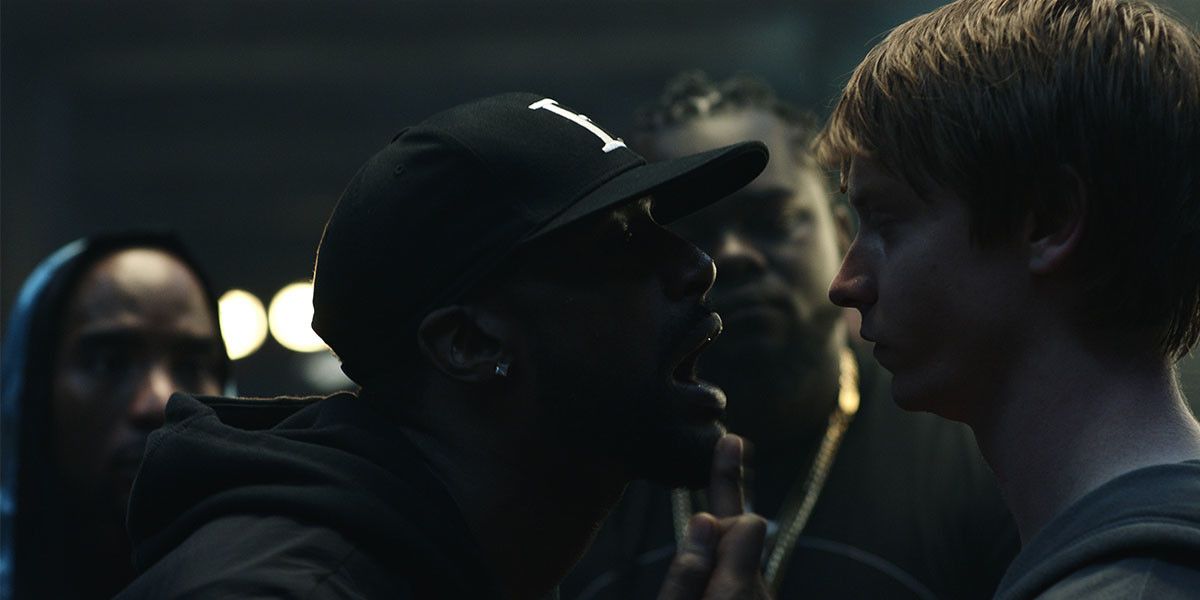Bodied (Joseph Kahn, 2017): USA
Reviewed by Kimberli Wong, viewed at AFI Fest 2017

Joseph Kahn hates white people. And based on the premise of the film, I’m allowed to say that.
To be clear, he doesn’t actually hate white people. He might actually hate all people, or at least one would think so listening to the main characters rap battle it out on stage. On that stage, anything goes, and all people are fair game. Race, gender, sexual orientation, nationality, class…. if you are it, you can be made fun of it for it. And as long as it’s in the context of the rap battle, it is OK.
Joseph Kahn said that he was inspired to make the movie because based on his experience, in social media, everyone thinks they are right. It doesn’t matter what you say, someone else will have an opinion about why what you said is offensive, or politically incorrect, or just plain wrong. He says that the only place he knew of where people could say whatever they wanted, and no one would jump all over them for it was… in a rap battle.
It’s an interesting proposition, and to me raises the question, when is criticism or critique of someone else, say, in social media, cultural nitpicking (or worse) and when is it, well, valid? What is the difference between “the haters” and “legitimate criticism?”
These were the thoughts running through my head as I watched Bodied, this explosive, aggressive, and entertaining critique of social criticism. The attitude is fierce, the rhymes are there, and the actors deliver… but, what, exactly, is Kahn trying to say?
It is a little difficult to discern, as at one point he is making fun of, for example, white, intellectual, elitist vegans, and the next he is slamming women in misogynistic rhymes which, I must admit, are a little unnerving to listen to, even if it is to be taken with a form of removed observation. At one point one of the battlers admits, “it does something to your soul” hearing these negative slams over and over and over again. And she is right.
The protagonist Adam (Calum Worthy) is a seemingly well-meaning, semi-bumbling white college student working on his Senior Thesis. He attempts to interview well-known battler Behn Grimm (Jackie Long), as “research.” It is pretty obvious from the beginning Adam is a closeted rap battler himself, who is just begging for someone to push him into the spotlight, and give him an excuse to follow his dream. To the dismay, of course, of his highly-educated, politically-correct, nag of a girlfriend, Maya (Rory Uphold).
On the one hand, Kahn is defending this impressive art know as battle rap, which is spoken word poetry with a serious edge, often done impromptu and with the aim of defeating your competitor. He invites the audience into this (misunderstood?) world, and shows that, just because you slam your competition in the ring, it doesn’t speak of who you are as a person. Behn Grimm, for all his battling prowess, is a game developer and family man trying to put food on the table. On the other hand, it doesn’t give you a free pass. In other words, if you are a jerk outside the ring, you are a jerk. Period.
So, is Kahn saying that, battle rap is battle rap, it’s all about how you live? Is he saying our world has become too politically correct, where anything anyone says is immediately deconstructed for racist, genderist, misogynist, nationalist, et al-ist undertones and intentions? Is that a cop out for the things that people say and do which actually are those things? Even if, they are good people?
I need to watch the film again. It’s that lit.
About this entry
You’re currently reading “Bodied (Joseph Kahn, 2017): USA,” an entry on Student Film Reviews
- Published:
- 11.21.17 / 11pm
- Category:
- AFI Filmfest 2017, Films
2 Comments
Jump to comment form | comments rss [?]